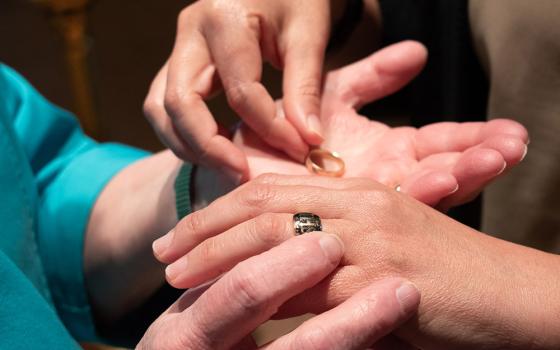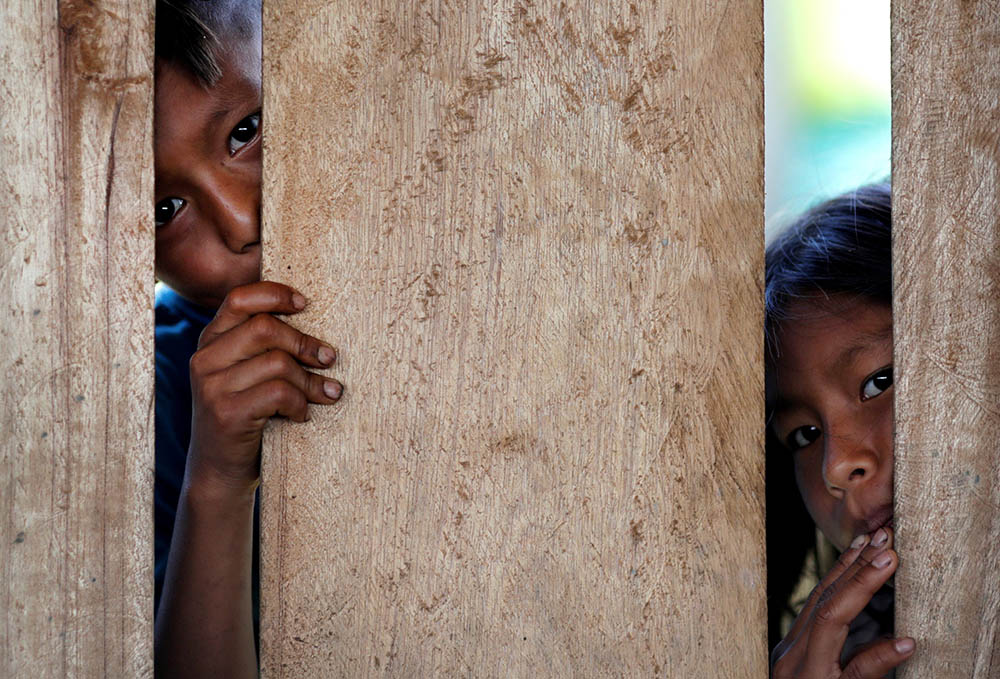
Children look on as relatives receive the Sinovac COVID-19 vaccine March 3 in São Gabriel da Cachoeira, Brazil. (CNS/Reuters/Ueslei Marcelino)

(GSR logo/Toni-Ann Ortiz)
Welcome to our fifth year of The Life, featuring a panel of 20 sisters who will reflect on issues that impact the lives of Catholic women religious around the globe.
We chose a panel from more than 50 applicants from around the world who reflect a diversity of ages, nationalities, religious congregations, ministries and charisms. They'll take turns writing responses to a prompt or a question about spirituality, religious life and other topics.
Our panelists this year have ties to or have worked in: Angola, Argentina, Armenia, Australia, Bangladesh, Brazil, Canada, Cameroon, Cuba, Ethiopia, France, Guatemala, Haiti, India, Italy, Iraq, Kenya, Nicaragua, Paraguay, Peru, the Philippines, Portugal, South Sudan, Tanzania, the United States and Vietnam.
They include an archaeologist, psychotherapist, nurse/midwife; a student in first vows, a widow/grandmother; teachers and school administrators from all levels; parish and campus ministers, theologians, spiritual directors and counselors; missionaries; sisters who have worked with youth, women, refugees, climate migrants, First Nations people and tribals; sisters in social work, journalism, writing and speaking; sisters who work in peacebuilding and development, anti-trafficking, and sustainable development (water issues); and with internal community ministries like leadership, vocations, oblates, formation and development. Meet all of our new panelists here.
Read the responses of this month's panelists to the prompt: Thinking about the reality of our world — like what's going on in your congregation/neighborhood/region/country/world — write a personal reflection, commentary or meditation on the theme of Advent.
______
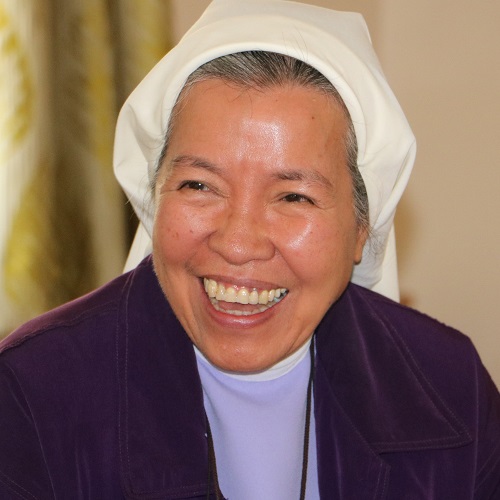 Vicenta Javier is from the Philippines, a member of the Religious of the Assumption. After eight years of missionary work in Vietnam, she is now in her 11th year of missionary work in East Africa. She is an educator but has also been a formator of young sisters in the Philippines, Vietnam, Tanzania and Kenya. Currently, she teaches part time at the Center for Leadership and Management at Tangaza University College in Nairobi, Kenya.
Vicenta Javier is from the Philippines, a member of the Religious of the Assumption. After eight years of missionary work in Vietnam, she is now in her 11th year of missionary work in East Africa. She is an educator but has also been a formator of young sisters in the Philippines, Vietnam, Tanzania and Kenya. Currently, she teaches part time at the Center for Leadership and Management at Tangaza University College in Nairobi, Kenya.
"Look, my first jacaranda for the season!" I told the sister with me as we drove out of Nairobi to our community in the next county of Machakos.
"Yes, it is Advent," she replied.
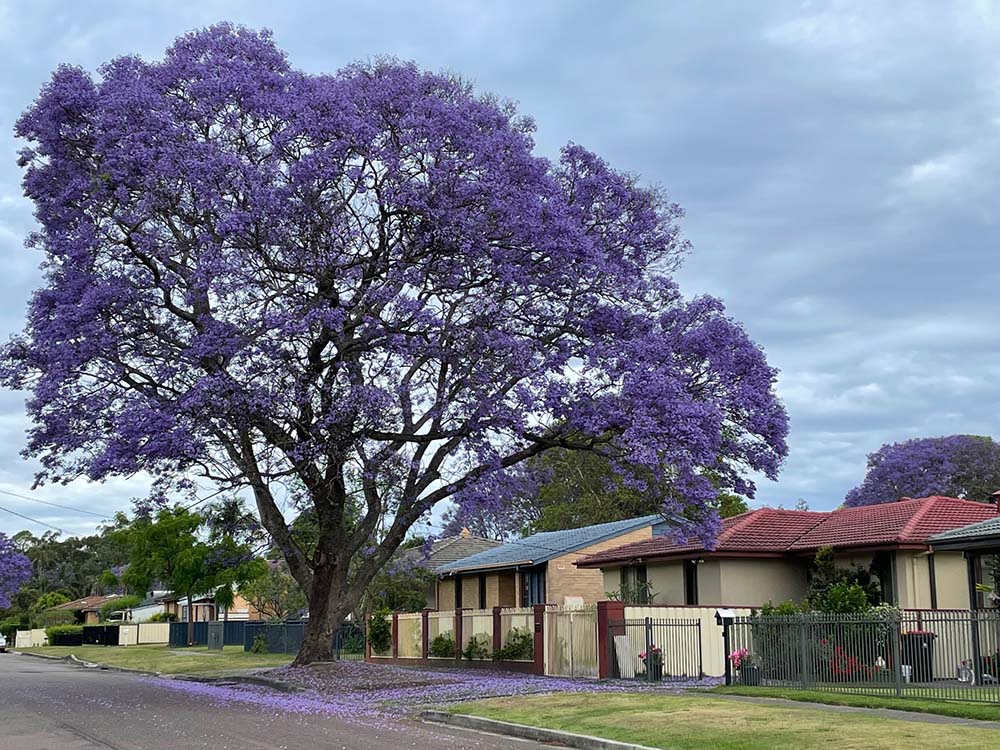
The jacaranda tree flaunts its Advent colors this time of year. (Tracey Edstein)
I had forgotten that here in East Africa, the blooming of the jacaranda tree is the sign Advent is coming. The summer comes on in the last months of the year and the jacaranda thrives in full sun and hot weather. It is then the jacaranda gloriously covers its wide crown of 10-15 meters with an intense display of purple-blue flowers.
I thought: What a beautiful sign of hope and promise for all that Advent signifies. The waiting and expectation of the One who brings salvation, life, freedom to a people walking in the darkness of violence, corruption, struggling for life. I read God's promise in Isaiah:
No longer will violence be heard in your land, nor ruin or destruction within your borders. But you will name your walls Salvation and your gates Praise. No longer will the sun be your light by day, nor the brightness of the moon shine on your night; for the LORD will be your everlasting light, and your God will be your splendor. Your sun will no longer set, and your moon will not wane; for the LORD will be your everlasting light, and the days of your sorrow will cease (Isaiah 60:19-20).
I think of the jacaranda as I look for signs of hope, of the seeds of the kingdom growing in the drought of the coming dry season.
I listen to the radio and I hear informed citizens discussing corruption, the implementation of the progressive elements of the Kenyan Constitution. In a webinar, I begin to see young people forming networks to oppose the politics that thrive on ethnic divides. I see ordinary men and women begin to speak up for what they believe in. They ask, will it take a thousand years to bring about change?
Advertisement
It takes 20 years for a jacaranda tree to reach maturity — especially if it starts from a seed. The jacarandas are blooming — the time of the maturing of the kingdom will come — that is the unbreakable promise of Advent. The Lord will be your everlasting light and the days of your sorrow will cease.
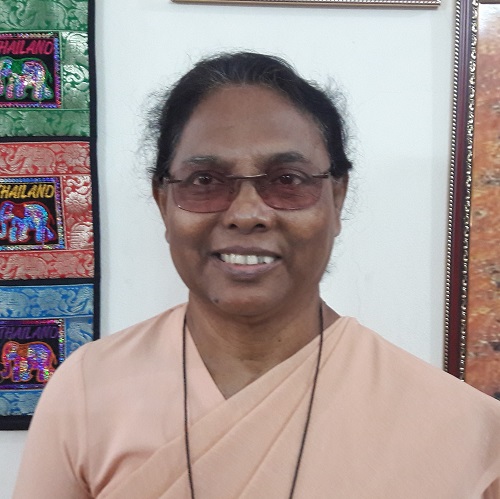 Probha Mary Karmokar is a Sister of Our Lady of the Missions in Bangladesh. Before final vows, she worked as a social worker in a rural village, lived with an international group of priests and religious of different congregations in a house of prayer, and directed an urban hostel. Later, she served in initial formation as provincial novice director and worked as a formator in Kenya. After studies in spiritual and pastoral theology, she served in Rome as a general counselor. Returning to Bangladesh, she was elected provincial superior for six years and is currently on the Bangladesh province leadership team.
Probha Mary Karmokar is a Sister of Our Lady of the Missions in Bangladesh. Before final vows, she worked as a social worker in a rural village, lived with an international group of priests and religious of different congregations in a house of prayer, and directed an urban hostel. Later, she served in initial formation as provincial novice director and worked as a formator in Kenya. After studies in spiritual and pastoral theology, she served in Rome as a general counselor. Returning to Bangladesh, she was elected provincial superior for six years and is currently on the Bangladesh province leadership team.
Since my early childhood, I understood that Advent is the preparation for Christmas, a time of great anticipation and joy, longing for the new dress, special food and reunion with extended family members that Christmas would bring.
Gradually, I learned that Advent hope includes not only celebrating a past coming of God to us, but a present and future coming, the grace of meeting Jesus in prayer, community and service now and longing for his coming in glory.
Advent — the season of Emmanuel, God-with-us — brings hope to us and is the proclamation of hope to our world.
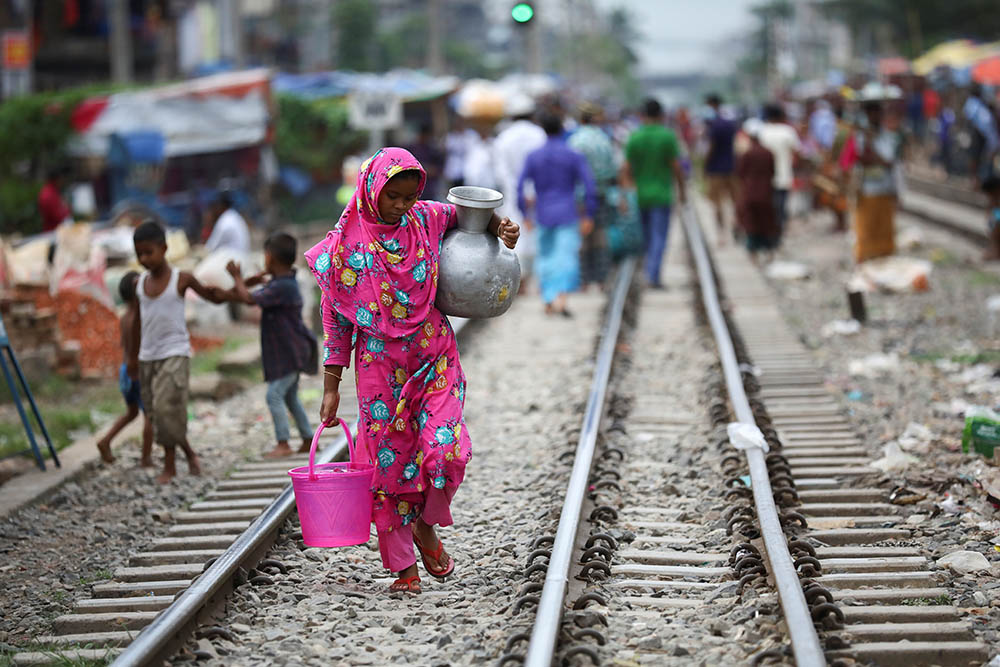
A woman carries drinking water along railroad tracks in a poor section of Dhaka, Bangladesh, Sept. 15, 2020. (CNS/Reuters/Mohammad Ponir Hossain)
The Province Leadership Team, of which I am a member, recently visited our sisters working in the Dinajpur Diocese in northwest Bangladesh. Our mission there is in a very remote area, and the people there are among the poorest in the diocese. The Catholics are converts from a very low caste of Hindu people. They are deprived and discriminated against in every way: socially, economically, in educational opportunities, and even in moral formation. They are marginalized in their own society as well as in the church.
Experiencing their situation, I thought of when the Israelites were in Egypt. How fervently they must have longed for God's intervention in their life of slavery, and prayed for the coming of the Messiah! Our people in this mission also want to come out of the tyranny of social prejudices and deprivation they suffer. And there is so much hope in them! Their hope is in the presence of our sisters. Their hope is that, as God used Moses, so God will use the Sisters of Our Lady of the Mission to help them toward a new life, enabling them to rejoice in Resurrection.
The people of Bangladesh are a people of hope. We live with constant uncertainty — one year a cyclone, another year flood, another year drought, another year so much rain that hundreds of villages disappear in the river and thousands of people lose their houses, belongings and cattle. And now the pandemic adds to the suffering of so many.
But people don't just mourn and sit idle. Without anything but their hope, they start a new life. They may not speak about the coming of Jesus in their life but they know hope! Bangladeshis of all religions believe that every misery is temporary, and they wait with hope for the God who is always coming into the world. They trust what Psalm 9:19 proclaims: God will never forget the needy, the hope of the afflicted will never perish.
Come, Lord Jesus, come and save our beautiful world.
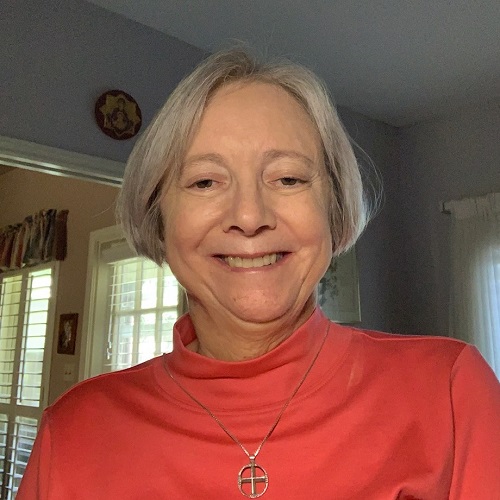 Celeste Larroque, a member of the Sisters of the Eucharistic Covenant, is a native of southern Louisiana. She has been in religious life for 47 years and currently is on her community's leadership team. She resides in Lafayette, Louisiana. A licensed clinical social worker, she has spent her career primarily in the areas of social services and psychotherapy. Currently, she is the delegate for religious in the Lafayette Diocese.
Celeste Larroque, a member of the Sisters of the Eucharistic Covenant, is a native of southern Louisiana. She has been in religious life for 47 years and currently is on her community's leadership team. She resides in Lafayette, Louisiana. A licensed clinical social worker, she has spent her career primarily in the areas of social services and psychotherapy. Currently, she is the delegate for religious in the Lafayette Diocese.
So many trees. Fallen trees. Broken branches and limbs hanging precariously overhead, waiting to plunge to the earth once the fatigue of holding on for too long is just too much. Officially, hurricane season ends on Nov. 30 each year. Then, almost immediately, we make the annual late autumn transition and Advent enters with a soft violet haze of candlelit reminiscence.
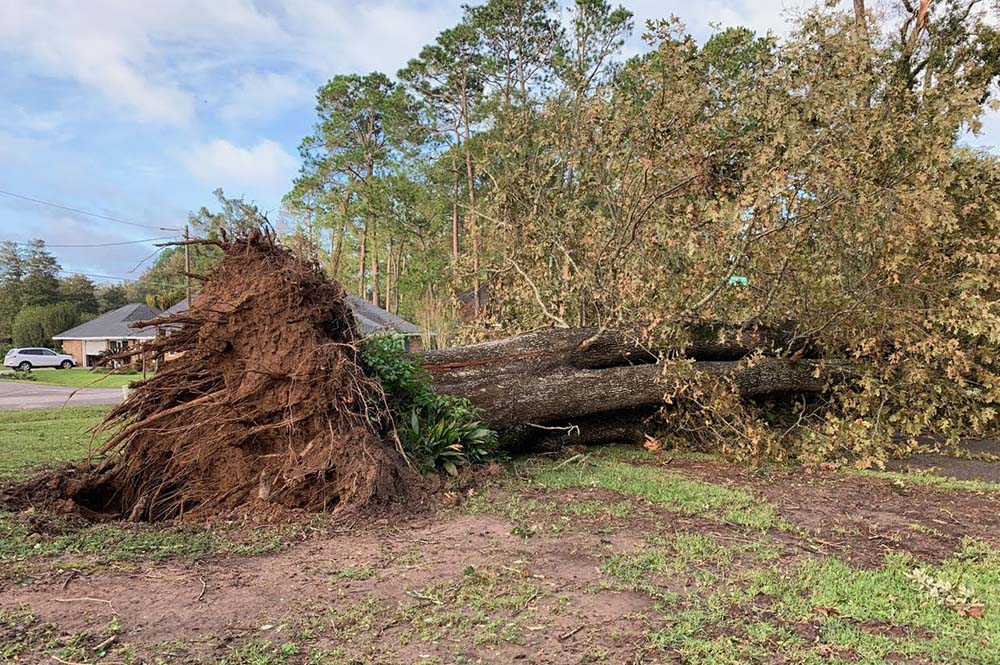
Uprooted oak tree after Hurricane Laura last year, Lafayette, Louisiana (Celeste Larroque)
The gradual lowering of the planet's dusky evening glow invites us to trust again in our waiting and hoping. We look into ourselves and open our hearts to the transition from wind-whipped trees to Jesse trees.
As autumn settles in the bayous and byways of south Louisiana, I am always eager to welcome the hushed tones of Advent. This season of patient waiting conveys to the senses an inner voice that is intimate, near and with almost no language to be fully understood.
In the climate of anxiety, fury, and loss during hurricane season each year, we always find ourselves in a holding pattern of vigilance and preparation. And then it's over — and Advent issues its annual invitation to a new preparation and a new waiting that begins and ends in a familiar peace recalled.
Gone are the frenetic outbursts of the months before. The seas have been calmed, the crashing waves have been silenced, and the flood waters have subsided. We are restored.
There are the other storms of this past year, no matter where one lives, that swept us at times into churning waters of discouragement and cynicism. At times, we have had to witness the moral failures of societal norms in the faces of war, natural disasters and the pandemic. We are doused in downpours of tweets and insta-everything to the point where we lose our own rootedness.
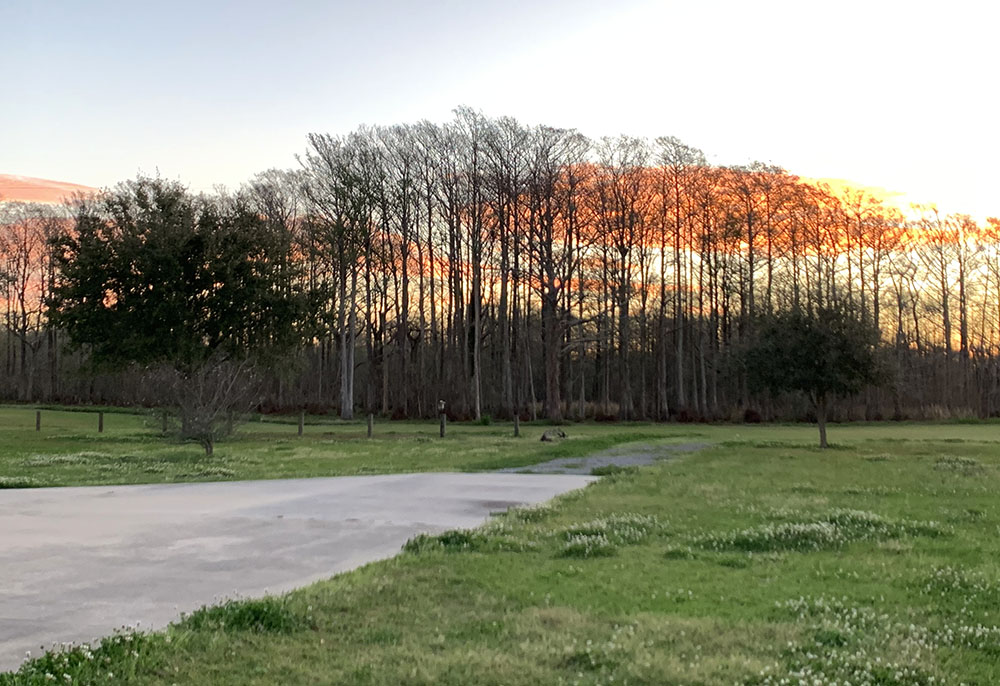
Lake Arthur, Louisiana, before it was devastated by Hurricane Laura (Celeste Larroque)
Advent may be just the balm needed for an overwrought soul. Starting with the image of the shoot sprouting from "the stump of Jesse" (Isaiah 11:1), there is the invitation to recall our own faith journey and how that journey is "rooted" in our own beloved trees, whose limbs have always enveloped us in our stormy lives. We live in the shade of their wisdom and pray in the breezes that lift their leafy limbs.
In Advent, we have a season to calm and restore our sacred spaces to make them ready once again to receive that "grace in place of grace" (John 1:16).
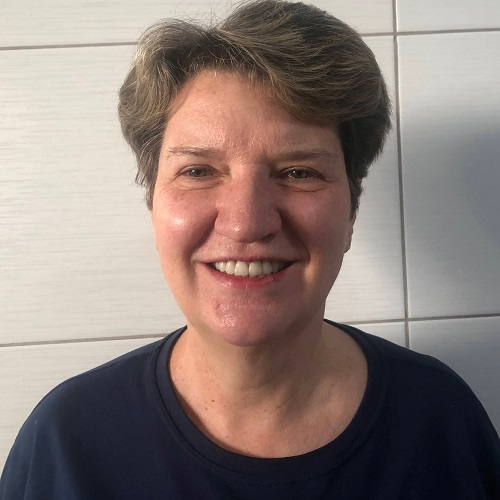 Rita Schneider is a member of the Sisters of the Immaculate Heart of Mary. She is originally from Brazil but worked for two years as a missionary in Haiti and more recently with Brazilian immigrants in the United States. She has an academic background in Portuguese, theology and sociology. Now back in Brazil, she is currently on the leadership team of her province and works on social projects with the poorest communities in south Brazil.
Rita Schneider is a member of the Sisters of the Immaculate Heart of Mary. She is originally from Brazil but worked for two years as a missionary in Haiti and more recently with Brazilian immigrants in the United States. She has an academic background in Portuguese, theology and sociology. Now back in Brazil, she is currently on the leadership team of her province and works on social projects with the poorest communities in south Brazil.
When I was a child — born into a family of poor farmers and living in the interior of southern Brazil — my parents had seven small children and we lived far from everything that could be considered modern. No electricity or running water. We studied in a very small rural school with one teacher for all classes.
A priest came from the town and said a monthly Mass at the school, which was transformed into a chapel for those celebrations. He used to arrive in a hurry, said the Mass hastily and left almost at a run, because there were many other rural communities waiting for him.
We lived almost all year waiting for Christmas; it was our biggest joy because it had the long holidays — from Christmas Eve to the New Year — when we did not have to go do the hard work in the land. The biggest joy was the little gifts Santa would bring us, plastic toys and candies, the only occasion when we saw those heavenly presents.
The years passed so fast, and today Advent still brings its hopes and smells of waiting, but my hopes today are so different! In the current reality of Brazil, with the awareness I have today, I no longer anticipate Advent and the Christmas or end-of-the-year celebrations out of my own personal or family interests, but I long in these days for something so much more seriously and deeply: that the pandemic will go away and never return. We — my country, our people — have endured so much these last two years!
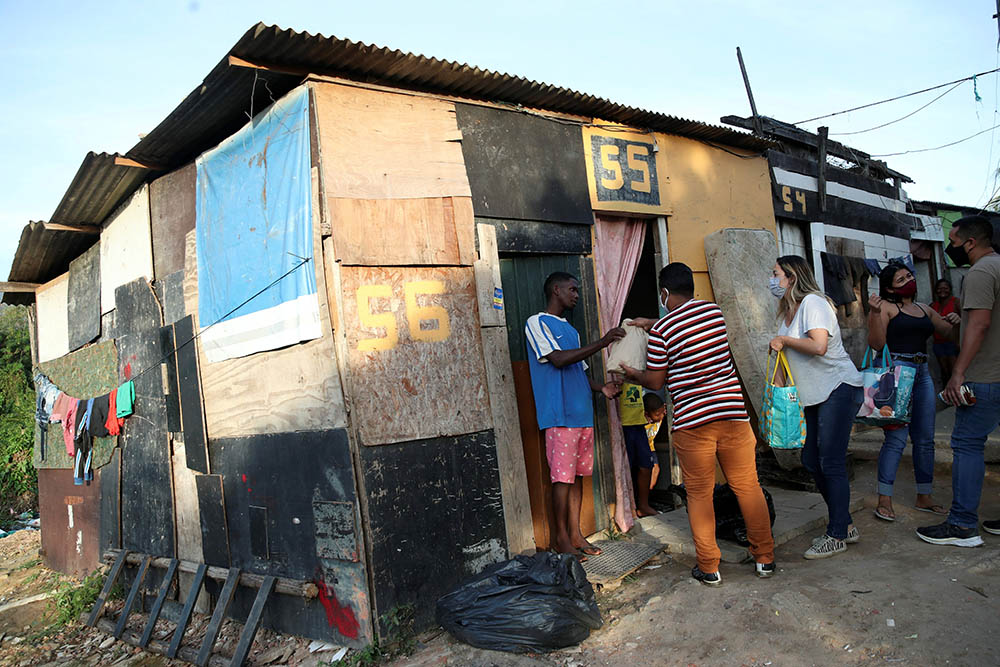
Residents in a poor section of Rio de Janeiro receive food and bread produced at the Sanctuary of Our Lady of Fatima during the COVID-19 pandemic. Volunteers delivered the bread June 24. (CNS/Reuters/Ricardo Moraes)
More than 600,000 people have lost their lives since the beginning of the COVID-19 pandemic, almost 15 million are unemployed, hunger and sickness are growing every day, and I sigh for Advent, but an Advent that brings us peace, hope and reasons to dream that a new world is possible.
I pray that the unemployed find work, that daily bread is not lacking at the tables of my brothers and sisters, and that everyone has access to health and education. And above all, the particular hope that I carry in my heart for this coming Advent of Jesus, waiting and hoping, is that we can have a leadership that has the sensitivity and commitment to justice and the good of all the Brazilian people, who do not deserve to live in a country of so much corruption.
Come Lord Jesus, the world needs you is a popular song sung throughout Brazil during the time of Advent. Come Lord Jesus, the world really needs you!
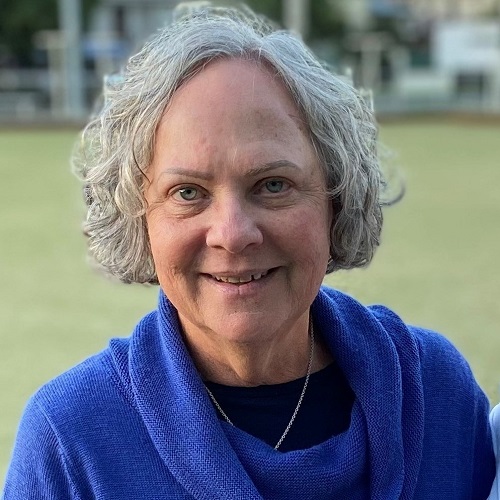 Annette Arnold is a Sister of St. Joseph of the Sacred Heart from Rockhampton, Queensland, Australia. She has an academic background in education, counseling, community development, mission studies, professional supervision and spiritual direction. She has taught in primary and secondary schools and conducted high school retreats and counseling. She has also worked as the executive office of the Brisbane Archdiocese's justice and peace commission and as the coordinator of the social action office of religious congregations. She has worked with First Nations women preparing to coordinate a safe house for victims of domestic violence and has served on her congregation's provincial and general councils and as a regional leader. She currently works in spiritual direction and professional supervision.
Annette Arnold is a Sister of St. Joseph of the Sacred Heart from Rockhampton, Queensland, Australia. She has an academic background in education, counseling, community development, mission studies, professional supervision and spiritual direction. She has taught in primary and secondary schools and conducted high school retreats and counseling. She has also worked as the executive office of the Brisbane Archdiocese's justice and peace commission and as the coordinator of the social action office of religious congregations. She has worked with First Nations women preparing to coordinate a safe house for victims of domestic violence and has served on her congregation's provincial and general councils and as a regional leader. She currently works in spiritual direction and professional supervision.
Are we there yet?
This is often something parents hear when taking children on a road trip. Along our highways now, there are trivia questions that are meant no doubt to help people cope with long trips, but they also serve to keep people alert and awake on tedious sections.
Are we there yet? is also a question so many in this country asked about the 80% COVID-19 vaccination rate we needed before opening Australia's interstate and overseas borders. Like the long road trip, these times are tedious and call for creativity, great patience and resilience.
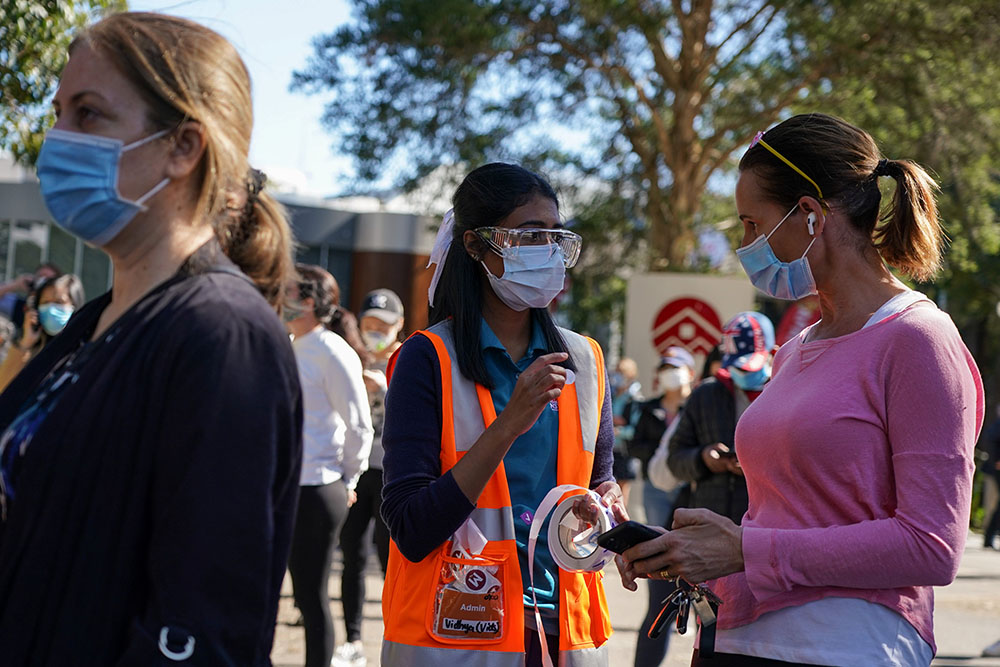
A staff member assists people waiting in line outside a COVID-19 vaccination center at Sydney Olympic Park during a lockdown to curb the spread of an outbreak in Sydney Aug. 16. (CNS/Reuters/Loren Elliott)
These COVID-19 lockdown times, while tedious and challenging, have given us many gifts, new opportunities, and discoveries — a bit like the ingenuity a mum has in finding ways to keep kids entertained on long car trips. Our sisters have learned to connect so well online and there has probably been more time in lockdowns to focus energy on some of the critical issues facing us — locally and globally.
We are confronted each day with our government's poor treatment of those seeking asylum in this country; the lack of political will and commitment to bring effective change in the quality of life and the rights and dignity of the First Peoples; action for the women and children of the world who are trafficked and oppressed; and, of course, all matters that impact climate and the care of Earth.
These, to just name a few. A lot of these issues are ones for which we have been waiting for resolution or breakthroughs for a very long time — we can well ask the same question of: Are we there yet? We have been asking and hoping for many years, and will need to keep doing so for many years to come — and we need that same creativity, patience and resilience.
In this Year of St Joseph, as we enter this Advent time of waiting, let's look to Joseph. Let's ask him to walk with us, especially in those moments when we are so sick of waiting! Joseph certainly had to wait, and no doubt from his experiences he has great empathy with us in these times.
Joseph knew his God and listened deeply. He was held steady and gifted with great trust, fidelity, risk-taking, patience and resilience. So, let's go to Joseph this Advent as we wait in hope in the transforming love of the Christ who comes.


